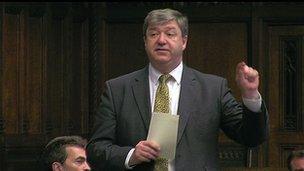No walk in the park
- Published
- comments
Panic stations? From the point of view of the government whips this afternoon's emergency Commons debate on English Votes for English Laws was really rather alarming.

The debate so skilfully secured by Lib Dem ex Scottish secretary Alistair Carmichael, produced a slightly pointless vote in which the Conservatives mostly abstained, but it brought all kinds of nasty tensions to the surface.
Conservative MPs are supposed to be signed up for EVEL under the terms of their manifesto, but there were clearly quite a few with doubts, some about the policy, many more about the process, which was Mr Carmichael's line of attack.
And I suspect that the underlying fear for some of the objectors on the Tory benches is actually a bit more personal; while EVEL tends to be seen as a way of dishing Labour and the SNP, it has the same effect on Tory awkward squaddies.
If the government majority on English issues suddenly soars over the 100 mark, they will cease to enjoy the kind of leverage over their leaders that they were anticipating with some relish, in the course of this Parliament. (To be sure euro-issues will mostly be whole UK issues and not subject to these provisions - but the scope for rebellion on domestic issues will be much reduced.)
Combine those with the constitutionalists who see the whole thing as a bad bodge, add in those who don't think the current proposals go far enough and the government might find itself in trouble. Which is why the sight of Peter Bone, Sir Edward Leigh and (perhaps most alarmingly of all) David Davis, expressing fifty shades of dissent, could signal trouble ahead.
The aggravating factor is that the normal escape route of enlisting DUP support may not be available either - the DUP are not keen on being carved out of English votes, which (a) they insist have ramifications on their turf and (b) would deprive them of a lot of leverage, too.
Of course there are plenty of Conservative MPs who are completely committed to the policy, but with pretty much all the Opposition parties lined up against, it won't take too many rebels (or abstainers) to defeat it, in the planned vote next week.
What next?
So the government may now be forced into concessions, at least on process. Maybe an inquiry by the Commons Procedure Committee before the vote is held? Maybe allowing amendments - Labour's Shadow Leader Angela Eagle scored a bit of a hit when she complained that there was no provision for detailed amendments to very complex rule-changes.
What the government really, really, doesn't want is to be dragged into implementing EVEL by heavy duty constitutional legislation which absorbs a vast volume of Commons time, then gets bogged down in the Lords and then (worst of all) may allow the courts to muscle in on the action and deliver rulings on whether the Speaker was right to decide that a particular bill was, or wasn't England only.
Ministers have strong reasons for taking the route towards EVEL that they have chosen (and that, indeed, they promised in detail in their election manifesto) but suddenly, it's no longer looking like a walk in the park.